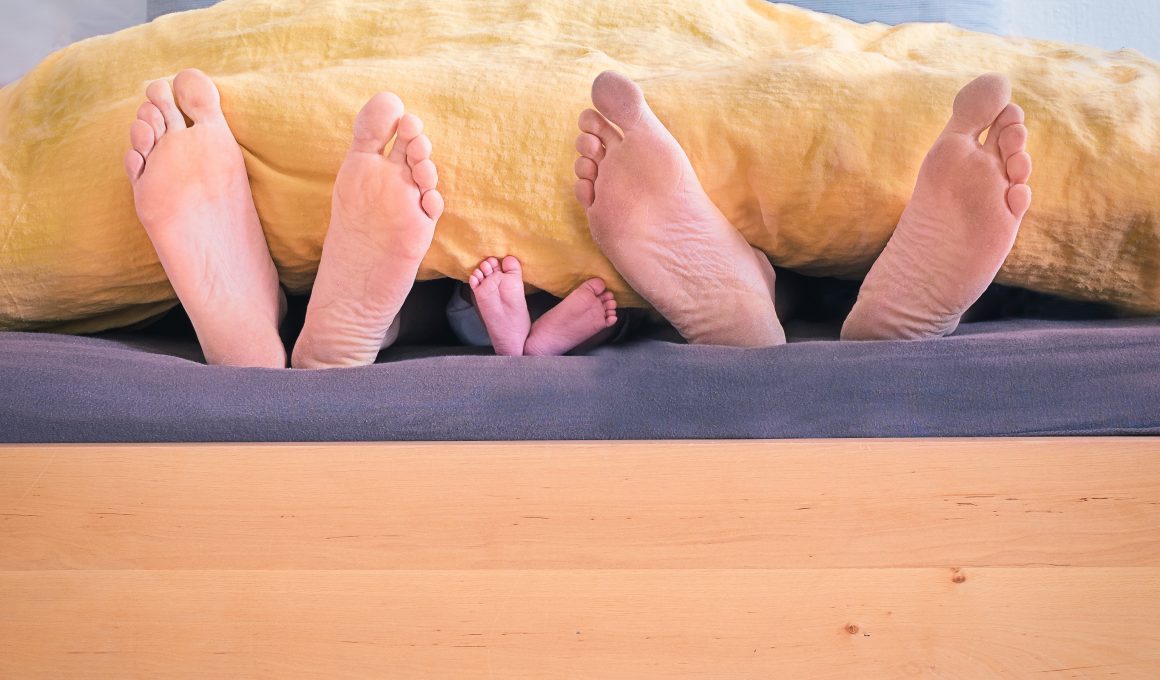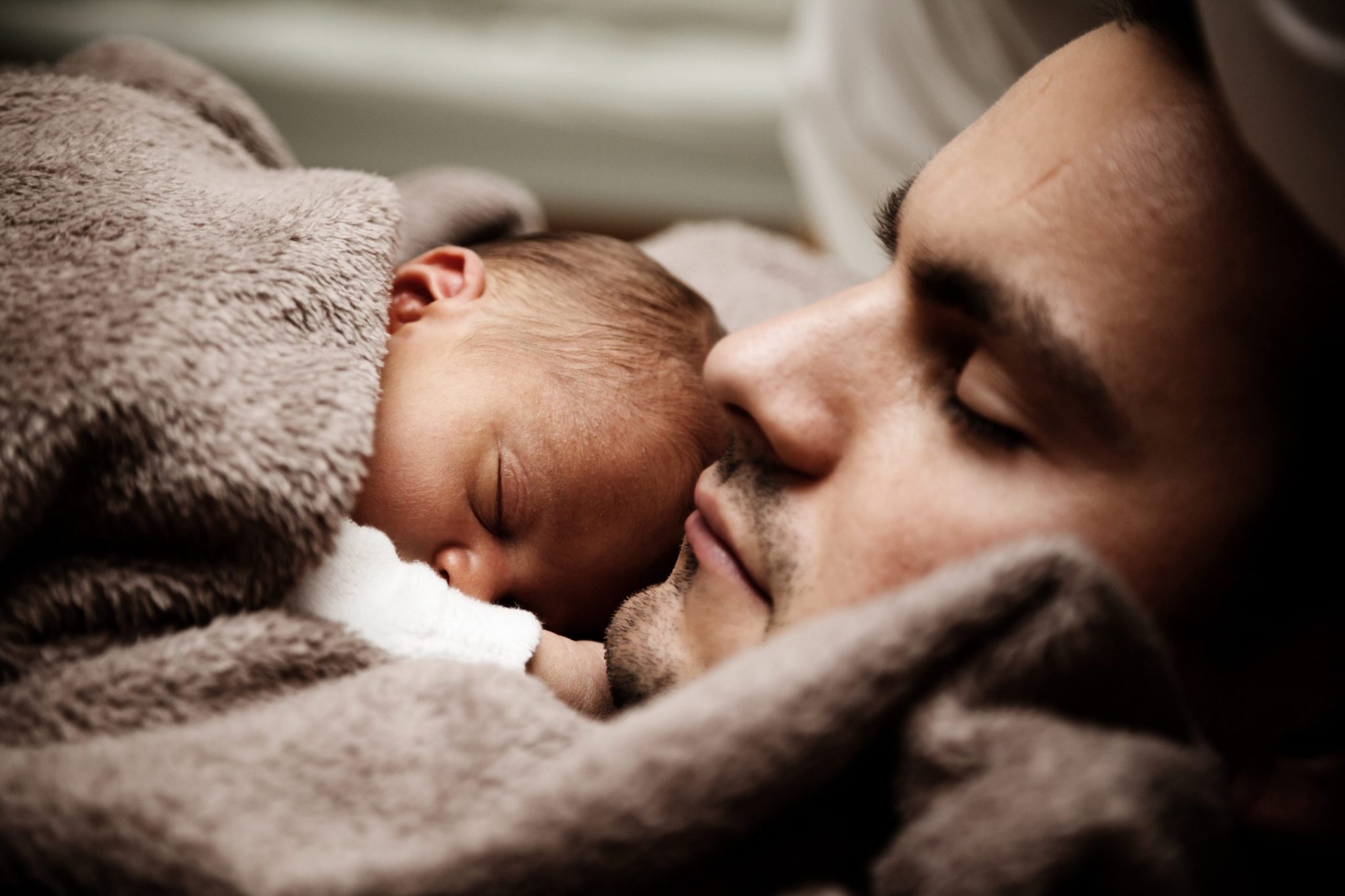Congratulations on your brand new addition to the family! Your bundle of joy is finally here and you can officially call yourself a parent.
Now prepare yourself for endless sleepless nights and the perpetual feeling of tiredness that just will not go away. “How much do new parents sleep?” you ask.
Well, that largely varies but the general answer is “hardly at all”.
Adults need 7 – 9 hours of sleep on average, per day (source). Unfortunately, new parents hardly ever get even close to that many hours of sleep per night.
In fact, on average men lose about 13 minutes of sleep per night whereas women lose more than an hour of sleep every night after becoming parents (source).
Even if your child is sound asleep, sometimes you might find yourself stressing out about when and if they do wake up.
Being in this constant state of anxiety will also negatively affect your ability to sleep peacefully (or at all). In truth, sleep deprivation and new parents are like a package deal.
ALSO READ: What Prevents Babies From Sleeping Through the Night?
Table of Contents
Does breastfeeding affect sleep?
Breastfeeding your child does contribute to changes in sleep patterns. Interestingly, according to research, breastfed infants wake up more than infants fed formula (source).
Moreover, it was also observed that breastfed infants wake up more often than formula-fed babies (source). So, if you chose to breastfeed your child, you are probably getting far lesser sleep.
It is not uncommon for new parents to fall asleep while feeding their infant. Since falling asleep in this scenario can prove to be risky, it is advised to nurse your child in a place and position where falling asleep harms neither you nor your child.
An adult bed is a good option to go for or simply seat yourself someplace comfortable. Make sure the spot you choose does not have hazards such as blankets or other objects that may pose a risk to you or your infant.
ALSO READ: How to Make Baby Sleep Without Feeding?
How to deal with sleep deprivation with a newborn
Making sure you get enough sleep as a parent will directly improve the quality of your life as well as your baby’s. Not only does low sleep negatively affect your health but it also influences your parenting style.
There is a lower chance of you engaging in positive parenting if you have not received sufficient rest (source). So how do new parents deal with no sleep? Badly. There, we said it. However, there are several ways to combat this problem.
Given how common it is, we have compiled an insightful guide to help you deal with sleep deprivation for new parents.
Saying no
As a new parent with a beautiful new addition to your family, you are bound to get a lot of visitors. Your family and friends will spare no time in planning visits and even showing up unannounced.
While they definitely come with good intentions, they cannot possibly understand what your parenting journey is like. There is nothing wrong with wanting to be by yourself.
Learn to say no and set boundaries. Be more comfortable with turning down invitations or delaying visits until you and your little one fall into a functional routine.
Power naps
You have probably been told to “nap while the baby naps”! In fact, you have probably heard it more times than you can count. This is not entirely terrible advice.
Yes, the chores around the house await and you are stressing out about the baby waking up any minute. We know; we have been there.
But, according to research, even naps as short as 10 – 20 minutes work wonders in reducing your stress levels (source). So get them while you can. Getting a quick power nap is the best and fastest way to recharge your body.
ALSO READ: What is the Best Way to Get My Child to go to Sleep?
Help is okay
A lot of parents feel ashamed to ask for help. They feel like asking for help is indicative of having failed as a parent. That is absolutely not true. Parents are humans, too. And everyone needs help once in a while.
Whether you need your partner to pitch in some more or want your friends to come over and help with house chores, learn to reach out for help when you are overwhelmed.
Instead of leaving things to pile up, divide and share your responsibilities. By asking for help, you will allow yourself more time to relax and unwind.
Taking some me time
You must prioritize your personal time. It is very easy to get swooped up in the rush of things and neglect yourself. Part of the process includes not hovering around your baby at all times.
That is why it is imperative to install a baby camera so you can have access to your child at all times without necessarily being physically present. This allows you to lull them back to sleep from the other room by using the two-mic communication system.
It also helps you keep an eye on them at all times and monitor their sleeping habits and health and wellness.
Sleep environment
The right sleep environment can work wonders on your baby’s sleeping habits. You’ll want to adjust the room or nursery’s temperature to neither be too hot nor too cold (ideally between 20 – 22 degrees Celsius or 68 – 72 degrees Fahrenheit).
Keep the lights dim and make sure it is quiet. If your baby does wake up in the middle of the night, make sure to alternate watching them with your partner. Most new parents sleep together in close proximity to the baby.
This way when the baby wakes up, they both do as well which makes it difficult to take turns sleeping.
Night-time rituals
Part of having a healthy sleep schedule is including night-time rituals such as bedtime reading or storytelling. It helps the child develop important bonds with the parents and also allows for much-needed family time.
This is especially helpful If you and your partner lead busy lives and do not find to connect during the day.
Sleep training
You should ideally begin sleep training at around six months. According to research, not only does sleep training help your baby sleep better but it also largely improves maternal mood (source). Some parents opt for sleep training as early as 4 months.
The important thing to remember is that you should do what works best for you and your child. You should also remember to remain consistent for at least 2 weeks in order to start seeing results.
ALSO READ: Sleep Training Methods: What is the Best One for My Baby?
Rejuvenate yourself
While it is not always possible to get a full 7 – 9 hours of sleep as a new parent, there are other ways to rejuvenate yourself.
Whether it is watching your favorite TV show, taking a long shower, or listening to your favorite album, make sure you invest in activities that help you unwind. Sometimes a walk around the block does wonders, too.
Avoid idle gossip
Stay away (and we cannot stress this enough) from “how to get your baby to sleep” conversations! No, you do not need to know how well Stacy’s baby is sleeping or how baby Noah is sleeping through the night.
Every child has their own sleeping patterns and parents of multiple children can attest to that. Participating in conversations like these will only stress you out and have you questioning your parenting abilities.
Having a cranky or light sleeper for a child is never a reflection of your own parenting skills or capacity.
Effects of Sleep Deprivation in Parents
Being sleep deprived as a parent is tough. You will find yourself falling asleep on the nearest possible surface (flat or not).
The breakfast table? Yeah, nothing looks more enticing.
The couch in front of the TV? Lord, the most comfortable of beds could not compete.
Chances are you can no longer distinguish between night and day. Every moment of peace is a chance to rest your weary self, even for a few seconds.
Sleep deprivation in new parents can adversely affect health, mood, and lifespan. Some of the more important side effects of being sleep-deprived that you should pay attention to are:
Mood disorders
Depression and anxiety are two of the most commonly diagnosed mood disorders associated with sleep deprivation. Make sure to visit your healthcare provider if you begin experiencing any symptoms that could indicate poor mental health.
Risk of Injury
Without adequate sleep, you are at a higher risk of getting into accidents and suffering injuries. A lack of sleep contributes to longer reaction times that increase the risk of accidents. Hence, it is important to steer clear of machinery and vehicles if you are low on sleep.
Irritability
Irritability is perhaps one of the earliest signs of sleep deprivation. If you are experiencing a general feeling of annoyance and find yourself lashing out at every minor inconvenience, that is a clear sign that your body and mind need to sleep.
As a parent, you should unapologetically prioritize sleep. Not only does it improve your health, mental and physical, but it also equips you to raise a child much better.
Being sleep deprived impairs judgment, increases the risk of accidents and injuries, causes increased irritability, heightens anxiety, and places you at a higher risk of depression. We’ve said it before, and we will say it again. Your baby needs you in the healthiest shape possible.
ALSO READ: How to Be a Good Mother? A Guide to Perfect Parenting
Before worrying about being the perfect parent, worry about being a healthy, present, and loving parent who has had a decent amount of sleep.










